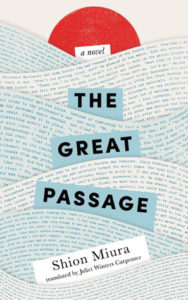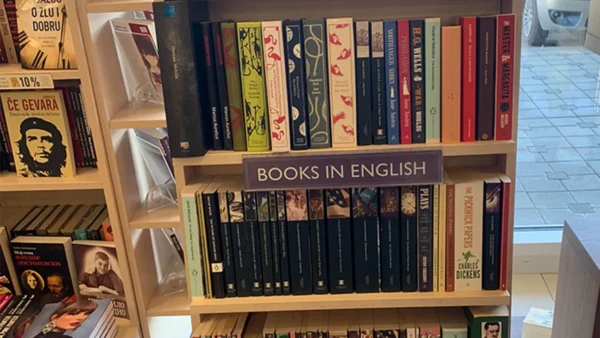The Great Passage by Shion Miura is a novel about a group of editors compiling a dictionary. If you’re looking for a fast-moving plot with plenty of action, this is not the book for you. But if you love language and are willing to be patient, it holds plenty of rewards.
When I say this is a novel about compiling a dictionary, I don’t mean that the dictionary compiling is a loose frame for a more exciting story. I mean that it really is about the details of the dictionary, which is called The Great Passage. It’s about the index cards, the tough decisions over what to include, the hiring of staff, the selection of appropriate paper stock, the checking of five sets of galleys, and the negotiations within the publishing company to push the dictionary to publication over many long years.
It sounds dull, but it isn’t. I think that’s because at its heart The Great Passage is a book about obsession. Many of the tasks we set ourselves in life are somewhat arbitrary, but there’s something compelling about seeing someone completely dedicated to something and pursuing it to the exclusion of all else. You end up rooting for this small band of obsessives, suffering with them when they discover a missing word close to publication and have to double-check the whole thing, and rejoicing with them as they complete a new entry or craft a particularly apposite definition.
It helps that the obsession is with books and language. If you’re a keen reader and/or writer, the characters will seem like kindred spirits. I identified with the shy, awkward Majime, who never seemed to say the right thing in person and sought refuge in the pages of books:
“No matter how poor he was at communicating with people, with books he could engage in deep, quiet dialogue.”
I loved, too, the way that working on the dictionary changed the characters. A couple of the staff members were not very interested in language to begin with, but immersing themselves in this world helped them to pay attention to the precise meaning and usage of words, which helped them learn how to live. Here’s one of them:
“Working on the dictionary, delving into words the way we do, has changed me, she thought. Awakening to the power of words—the power not to hurt others but to protect them, to tell them things, to form connections with them—had taught her to probe her own mind and inclined her to make allowances for other people’s thoughts and feelings.”
Another is a brash character who learns to show some vulnerability, while even the shy Majime learns to connect with other people more effectively. It’s this slow process of character development, intertwined with and influenced by the dictionary they’re creating, that makes the novel so satisfying.
And running through it all is a wonderful extended metaphor about life as a sea on the surface of which words gather as little points of light. The “Great Passage” that gives the dictionary and hence the novel its title refers to the journey of a ship across the sea of words, helping people to pick up and gather these small points of light, with which they can tell each other what they’re thinking and feeling more accurately and so form closer connections.
I discovered The Great Passage through a review on The Reading Life, and I’m very glad I did. It was a pleasure to read and gave me plenty of food for thought.
This post is my contribution to the Japanese Literature Challenge organised by Dolce Bellezza. It runs from January to March, so there’s still plenty of time to join in by reading either this book or any other work of Japanese Literature. Let me know if you’re participating, and I’ll go and read your contribution!





There are 16 comments
You made what I would have though a tedious subject sound fabulous. I loved how you said that it involves language, and finding just the right word. (I am saddened by the way that so many people speak English so poorly, even incorrectly, and the way texting has come to replace proper spelling. I once read a question that asked, “What do all the people who spell ur (you are) do with their extra time?”)
I also loved this line of yours: “…there is something compelling about seeing someone completely dedicated to something and pursuing it to the exclusion of all else.” I have that kind of (compulsive) fascination and dedication to projects, although I will eventually burn out and pick up something new. But, getting is just right is so satisfying!
Finally, the characters sound like those I would like to know. I can completely relate to Majime who retreats to the pages of a book after finding it difficult to express what she wanted with people. (Why, when confronted with someone rude, do I find the perfect response a day later?)
I downloaded this book on my kindle when Amazon offered it free of charge on International Translation Day (I think that’s right), and I have yet to read it. Somehow I thought it was having to do with the sea, and yet I find your review far more interesting than the initial thoughts I had toward it.
Hi Bellezza, ur rite its awesome!
OK, I was going to write my whole comment like that, but I can’t keep it up. Words and their precise meanings do play an important role in the book in various ways. I should have said also in my review: kudos to the translator, Juliet Winters Carpenter, for conveying those meanings effectively in English, even though the original words are Japanese. It really worked well.
Ah, I missed the freebie on this one – I paid for it after reading Mel’s review, and in this case I’m glad I did. A really different and very satisfying book. Thanks very much for organising the challenge and giving me the incentive to read it.
Oh, and finding the perfect response a day later? Yep, story of my life!
Your post makes this sound so good. But I must admit that I would find the description interesting due to my geek kind internets. I love books, I love words and I am fascinated by the concept of cataloging.
I also need to read more Japanese literature. I have resolved to read more books from different cultures this year.
Well, this sounds perfect for you, Brian! From one book geek to another, I recommend it and hope you enjoy it. And if you read it before March, you can join the challenge too!
I also loved all The food references. I agree The more you Love Reading, The more you Will relate to this very moving book. It was great to see several characters find Love. Thanks for mentioning my post.
Ah yes, the food references! There were a lot of them, weren’t there? I got quite hungry as I was reading. And I liked how the food choices reflected the character development sometimes, e.g. Majime going from instant ramen noodles to more refined fare.
Dull? Pssssht, this sounds absolutely fascinating. But I am one of those obsessives, so I’m making the assumption that it would feel like reading about my people. Also, I find the process of dictionary building and definition writing utterly fascinating.
I agree, Nikki! I found it fascinating too, but I suspect its appeal might be limited to obsessives like us… There is a LOT of detail on the process of dictionary building, so I think you would love this one.
And on the subject of words, I think I might adopt your “Pssssht”—so expressive! Maybe if we spread its usage enough, we can get it into the dictionary one day alongside the likes of “Psst” and “Pshaw”!
Words? Food words? People who obsess over language? Not to mention, a way to join Bellezza’s Japanese challenge and balance out the descriptive, dictionary-disdaining Words on the Move by James McWhorter that I just read? I’m persuaded. Thank you!
I’m pleased to see that this book is proving so popular in the comments! Welcome to the challenge, and I hope you enjoy The Great Passage 🙂 I’d love to see what you make of it, so please drop a link here if you do end up reviewing it.
You have made me want to read this book. I bought it awhile ago, but for some reason kept putting it off. After reading this post, I can’t believe that I’ve been putting it off. It sounds like my cup of tea. Can’t wait to dive in. Thanks!!
I’m glad to hear that, Nadia! Hope you enjoy it. We both need to thank Mel U, whose original post made me want to read it 🙂
Oh my goodness, this sounds fantastic!
Yes, I think you’d enjoy it, Stefanie!
Thanks for the mention. I found this a deeply moving work.
You’re welcome, Mel! Thanks for introducing me to this wonderful book.